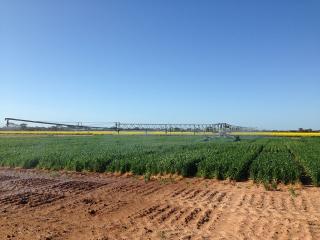WA research on the drought tolerance of wheat varieties could assist growers to make variety selection decisions to maximise productivity.
Findings of wheat drought tolerance research undertaken by the Department of Agriculture and Food and funded by the Grains Research and Development Corporation (GRDC) will be presented at the GRDC Grains Research Update, Perth.
Department grains research officer Glenn McDonald said better selection and genetic improvement were essential to sustaining the future of the grains industry.
“There is diversity in the drought tolerance of commercially available wheat varieties, enabling growers to use this new information when selecting a variety most suited to their growing conditions,” Mr McDonald said.
“Breeders who want to improve the drought tolerance of new breeding lines by selecting breeding material from varieties with the highest and most reliable drought index values will also benefit from this research.”
The research was conducted at the department’s Managed Environment Facility (MEF) at Merredin, and MEFs in Narrabri and Yanco in New South Wales, over the 2011 to 2014 seasons.
Findings of the research undertaken at Merredin are being presented at the Grains Research Update on 1 March.
Mr McDonald said small plot trials including all current National Variety Trial varieties, as well as older varieties including Janz and Westonia and selected breeding material, were sown in the Merredin MEF over the four seasons.
“Two different growing environments were created each season, one using strategic irrigation of approximately 60mm above the naturally occurring rainfall during the flowering and post flowering period and the second using just the naturally occurring rainfall,” he said.
Plant and environment data was recorded over the growing seasons in order to understand, in particular, how the different growing environments impacted on yield.
The average yields for rainfed plots ranged from 1.4 to 2.6 tonnes/hectare, while those that received supplementary irrigation ranged from 2.1 to 3.6 t/ha across the four seasons.
Mr McDonald said generally the higher the average yield for a variety, the higher the drought tolerance index was.
“However, there is some variability in the drought index which indicates some varieties are more drought tolerant than others.
“For example, both Trojan and Drysdale varieties had identical yields under the rainfed environment, but the difference in response to the irrigation, or higher rainfall, resulted in Trojan having a higher drought index and is hence more drought tolerant than Drysdale.”
Mr McDonald said growers should consider their seasonal growing conditions when reviewing the research trial data.
“Response to drought should always be considered, along with quality classification, disease resistance ratings and maturity when deciding which variety to grow,” he said.
“For example, a wheat grower in the low rainfall area of the eastern Wheatbelt, when choosing between varieties with similar yields, should choose a variety with a high yield for their growing conditions and a low drought index value such as Mace, Corack, Scout or Envoy.
“This means that if the grower receives extra rainfall during spring, compared to normal, then the variety is better able to take advantage of this rainfall, resulting in a better yield opportunity.
“Alternatively, a grower in a higher yield potential area with more reliable rainfall (represented by the irrigated environment in the MEF trials), could look at varieties including Emu Rock, Dart, Derrimut or Estoc, with a higher average yield in the irrigated environment and a higher drought index value.
“These varieties maintain yields during drier seasons compared to varieties with a lower drought index, based on these trials at Merredin.”
A copy of the 2011-14 research trial information from the Merredin site is available to agronomists and growers from giwa.org.au/2016researchupdates
GRDC Grains Research Updates, Perth will be held on 29 February and 1 March 2016 at Perth Convention and Exhibition Centre. To register or for further information visit giwa.org.au/2016researchupdates

Media contacts: Jodie Thomson/Katrina Bowers, media liaison, +61 (0)8 9368 3937/3789
